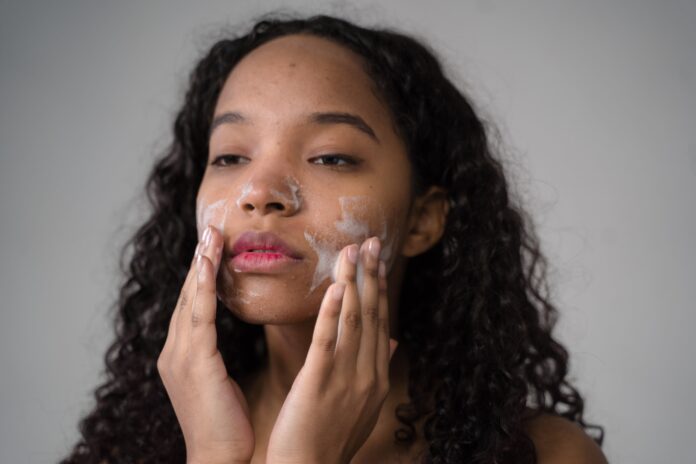I. Introduction
Diet is a fundamental factor for skin health, as it reflects the internal state of the body. A balanced diet rich in nutrients can prevent and treat various skin problems, such as acne, wrinkles, inflammation and allergies. On the other hand, an inadequate and poor-quality diet can cause damage to the skin, compromising its appearance and function.
In this article, we will address the main foods that can harm or benefit skin health, explaining the mechanisms involved and nutritional recommendations. We will also discuss individual variations in response to foods and the importance of consultation with healthcare professionals for an integrated approach. Finally, let's answer some frequently asked questions about diet and skin.
We hope this article is useful for you who want to take better care of your skin and your health in general. Good reading!
II. Foods that are harmful to the skin
In this chapter, we will address some of the foods that can harm the health and beauty of your skin. These foods are rich in substances that can cause inflammation, acne, oiliness, collagen loss and premature aging. See what they are and why you should avoid or reduce them in your diet.
A. Refined Sugars and Simple Carbohydrates
Refined sugars and simple carbohydrates are those that digest quickly and quickly raise blood glucose levels. They are present in foods such as white bread, cakes, cookies, soft drinks, sweets and ice cream.
Excessive consumption of these foods can affect the production of collagen, which is the protein responsible for the firmness and elasticity of the skin. This occurs because sugar binds to collagen fibers and damages them, in a process called glycation. Glycation also favors the formation of free radicals, which are unstable molecules that cause cellular damage and aging.
Additionally, refined sugars and simple carbohydrates can increase inflammatory processes in the skin, which are related to various conditions such as acne, rosacea, dermatitis and psoriasis. Inflammation also contributes to collagen degradation and loss of skin radiance.
B. Trans and Saturated Fats
Trans and saturated fats are those that have a chemical structure that makes it difficult for the body to metabolize them. They are present in foods such as fried foods, snacks, margarine, butter, fatty meats and sausages.
Excessive consumption of these fats can increase skin oiliness and the formation of acne. This happens because they stimulate the production of sebum by the sebaceous glands, which is the natural oil that lubricates the skin. When there is excess sebum, it can mix with dead cells and bacteria on the skin's surface and clog pores, causing inflammation and infection.
Trans and saturated fats can also affect premature skin aging, as they increase oxidative stress and inflammation in the body. These factors can lead to the loss of collagen, elastin and hyaluronic acid, which are essential components for keeping the skin firm, hydrated and wrinkle-free.
C. Dairy
Dairy products are foods derived from animal milk, such as cheese, yogurt, condensed milk and cream. They are sources of protein, calcium and vitamins, but they can also have some negative effects on the skin.
One of the possible problems with dairy products is that they can increase sebum production in the skin, as can trans and saturated fats. This is due to the fact that they contain natural or added hormones that can interfere with the hormonal balance of the human body. Some studies suggest that there is a relationship between dairy consumption and an increased incidence or severity of acne.
Another possible problem with dairy products is that they can cause allergies or food intolerances in some people. These reactions can manifest on the skin in the form of redness, itching, swelling or rashes. Some people may also be sensitive to gluten or lactose in dairy products, which can cause intestinal inflammation and indirectly affect skin health.
III. Healthy Alternatives and Protective Nutrients
All is not lost for those who want to have beautiful and healthy skin. There are some foods that can help protect and improve the appearance of your skin, thanks to their essential nutrients. Let's see what they are and how they act in the body.
A. Antioxidants and Essential Vitamins
Antioxidants are substances that fight free radicals, unstable molecules that cause damage to cells and DNA, contributing to premature aging and the emergence of diseases. Some of the main antioxidants are vitamins A, C and E, which also have specific functions for skin health.
Vitamin A is responsible for cell renewal and the production of collagen, the protein that gives firmness and elasticity to the skin. It also helps prevent acne as it regulates sebum production. Some foods rich in vitamin A are: carrots, pumpkin, sweet potatoes, mango, spinach and broccoli.
Vitamin C is a powerful antioxidant that neutralizes free radicals and stimulates collagen synthesis. It also has anti-inflammatory and whitening properties and can reduce blemishes and redness on the skin. Some foods rich in vitamin C are: orange, lemon, acerola, kiwi, strawberry, tomato and pepper.
Vitamin E is another antioxidant that protects skin cells from damage caused by sun exposure, pollution and stress. It also helps maintain skin hydration, preventing dryness and flaking. Some foods rich in vitamin E are: vegetable oils, seeds, nuts, avocado and wheat germ.
B. Lean Proteins and Omega-3 Fatty Acids
Proteins are the building blocks of our body, being fundamental for the formation of tissues, muscles, organs and skin. Proteins also participate in the production of collagen and elastin, fibers that provide support and flexibility to the skin. Furthermore, proteins help in wound healing and in defending the body against infections.
Lean proteins are those that are low in saturated fat and cholesterol, making them healthier for your heart and skin. Some examples of lean proteins are: fish, skinless chicken, eggs, skimmed milk and dairy products, tofu and legumes.
Omega-3 fatty acids are good fats that have several benefits for skin health. They act as natural anti-inflammatories and can alleviate conditions such as acne, eczema and psoriasis. They also improve blood circulation and tissue oxygenation, favoring skin nutrition. They also prevent premature aging by fighting free radicals and increasing skin hydration.
Omega-3 fatty acids are found mainly in cold-water fish such as salmon, tuna, sardines and herring. Other sources are: flaxseed oil, chia, walnuts and pumpkin seeds.
C. Hydration and Importance of Water
Water is the most abundant component of our body and our skin. It is essential for the transport of nutrients, the elimination of toxins, the regulation of body temperature and the functioning of cells. Water is also essential for maintaining skin elasticity and luminosity.
Dehydration can cause several skin problems such as: dryness, wrinkles, sagging, dark circles and swelling. Therefore, it is important to drink at least 2 liters of water per day, or more if fluid is lost through sweat, urine or feces. In addition to water, other liquids that can contribute to hydration are: natural juices, teas, coconut water and soups.
It is also possible to hydrate your skin through diet, consuming foods with a high water content such as fruits, vegetables, legumes and yogurt. These foods also provide vitamins, minerals and antioxidants that help maintain skin health.
IV. Individual Considerations and Professional Consultation
So far, we've seen how diet can influence the health and appearance of your skin, both positively and negatively. However, it is important to remember that each person is unique and may have a different response to the same foods. Therefore, it is essential to take individual characteristics into account and consult health professionals before making dietary changes.
A. Variations in Individual Response to Food
Genetics and predisposition to adverse skin reactions
Genetics is a factor that can determine how the skin reacts to food. Some people may have greater sensitivity or intolerance to certain components, such as gluten, lactose or dyes. These substances can trigger inflammatory or allergic processes in the skin, causing redness, itching, rashes or eczema.
Other people may be predisposed to developing acne or rosacea, which are chronic inflammatory skin conditions. In these cases, some foods can worsen or improve symptoms, depending on the individual. For example, some studies suggest that milk and dairy products may be associated with an increase in acne in some people but not in others.
Personal observation and dietary adjustments as needed
Given individual variation, it is important for each person to observe how their skin reacts to the foods they consume. One way to do this is to keep a food diary, writing down what you ate and how your skin behaved in the following days. This way, it is possible to identify possible triggering or skin-protective foods.
Based on this observation, it is possible to make adjustments to the diet as necessary. For example, if you notice that your skin becomes more oily or inflamed after eating foods high in sugar or fat, you can reduce or avoid these foods. On the other hand, if you notice that your skin is more hydrated or luminous after consuming foods rich in antioxidants or omega-3s, you can increase or include these foods.
B. The Importance of Consultation with Health Professionals
While personal observation is helpful, it is not a substitute for consultation with qualified healthcare professionals to assess and advise on skin health. A dermatologist is a doctor who specializes in diseases and skin care, and can diagnose and treat problems such as acne, rosacea, dermatitis, psoriasis, among others. A nutritionist is a professional qualified to prescribe diets suited to each person's needs and objectives, taking into account dietary preferences and restrictions.
Consultation with these professionals is important to obtain an integrated and personalized approach to skin health. They can indicate which foods are most suitable or harmful for each case, as well as recommend nutritional supplements if necessary. In addition, they can advise on other healthy skin habits, such as using sunscreen, proper cleansing and regular hydration.
FAQ (Frequently Asked Questions)
One of the most common concerns for those concerned about the health and beauty of their skin is the relationship between diet and the appearance of acne, blemishes, wrinkles and other dermatological problems. In this section, we will answer some of the most frequently asked questions on this topic, based on scientific evidence and expert recommendations.
- Can I eat chocolate without harming my skin?
Chocolate is a delicious food, but also controversial when it comes to its influence on the skin. The truth is that there is no definitive answer to this question, as it depends on several factors, such as the quantity, frequency, type and quality of chocolate consumed, in addition to the individual characteristics of each person. In general, dark chocolate, with a higher cocoa content and lower sugar and fat content, is the most beneficial for health and may even have antioxidant and anti-inflammatory effects, which protect the skin from premature aging. Milk or white chocolate, which contain more sugar and fat, can contribute to increased sebum production and inflammation in the skin, favoring the appearance of acne. Therefore, the ideal is to consume chocolate in moderation and prefer healthier versions. - What are the most recommended foods for healthy skin?
There is no miracle diet that guarantees perfect skin, but some foods can help nourish, hydrate and protect the skin from the inside out. Some examples are:
- Fruits and vegetables rich in vitamins, minerals and antioxidants, such as oranges, lemons, strawberries, kiwi, carrots, tomatoes, spinach, kale and broccoli. These foods fight free radicals, which cause damage to skin cells and accelerate aging.
- Food sources of essential fatty acids, such as omega-3 and omega-6, which are found in fish, nuts, seeds and vegetable oils. These nutrients have anti-inflammatory and moisturizing properties, which improve skin elasticity and appearance.
- Foods rich in proteins with high biological value, such as lean meats, eggs, milk and dairy products. Proteins are essential for the formation of collagen and elastin, which are the fibers that give support and firmness to the skin.
- Food sources of probiotics, such as natural yogurt, kefir and kombucha. Probiotics are beneficial bacteria that live in the intestine and help regulate the immune system and prevent skin infections.
- Foods rich in water or with high diuretic power, such as watermelon, melon, cucumber, pineapple and green tea. These foods help keep the skin hydrated and eliminate toxins from the body.
- How can I identify if my diet is negatively impacting my skin?
Diet can affect skin health positively or negatively. Some signs that your diet may be damaging your skin are:
- Increased oiliness or dryness of the skin
- Appearance or worsening of acne
- Appearance or intensification of spots or redness on the skin
- Loss of radiance or luminosity of the skin
- Increased expression lines or wrinkles
If you notice any of these symptoms on your skin, it may be interesting to evaluate your diet and check if there are any foods that may be causing an allergy or food intolerance. Furthermore, it is important to avoid excessive consumption of foods that can harm skin health, such as:
- Refined sugar and foods rich in simple carbohydrates (sweets, cakes, cookies, etc.), which increase blood insulin levels and stimulate sebum production and inflammation in the skin
- Saturated and trans fats (fatty meats, fried foods, margarine, processed products, etc.), which also promote inflammation and skin aging
- Salt and foods rich in sodium (sausages, canned foods, ready-made seasonings, etc.), which cause fluid retention and swelling of the skin
- Alcohol and caffeine, which have a diuretic effect and dehydrate the skin
- Foods that are potentially allergenic or irritating to the skin, such as milk and dairy products, gluten, soy, peanuts, seafood, dyes and preservatives
Remember that diet is just one of the factors that influence skin health. Other important aspects are adequate hydration, sun protection, cleansing and hydrating your skin with products suited to your skin type, quality sleep and stress control. For more personalized guidance, consult a nutritionist and a dermatologist.
References
Avoid These 10 Foods For Clearer Skin | PrescriptionDoctor
Worst Foods for Skin and Complexion? (webmd.com)
How Your Diet Affects Your Skin – The New York Times (nytimes.com)








